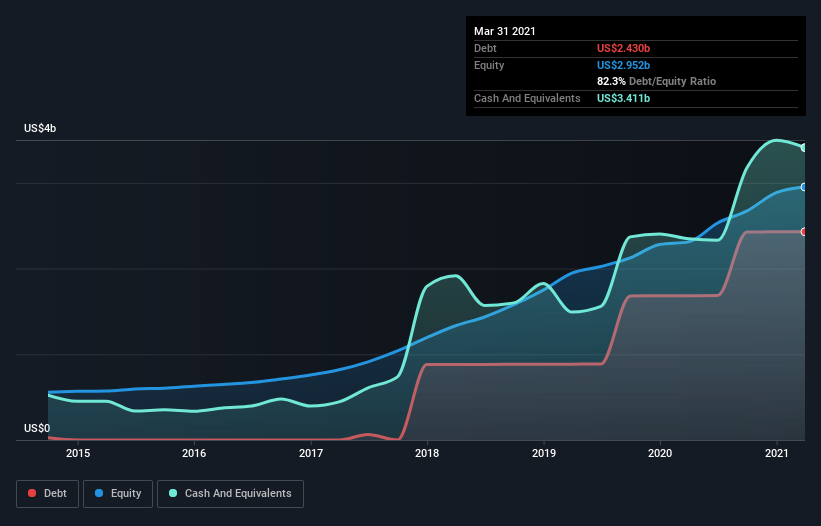
Legendary fund manager Li Lu (who Charlie Munger backed) once said, 'The biggest investment risk is not the volatility of prices, but whether you will suffer a permanent loss of capital.' So it seems the smart money knows that debt - which is usually involved in bankruptcies - is a very important factor, when you assess how risky a company is. We note that Weibo Corporation (NASDAQ:WB) does have debt on its balance sheet. But the more important question is: how much risk is that debt creating?
Why Does Debt Bring Risk?
Generally speaking, debt only becomes a real problem when a company can't easily pay it off, either by raising capital or with its own cash flow. Part and parcel of capitalism is the process of 'creative destruction' where failed businesses are mercilessly liquidated by their bankers. However, a more usual (but still expensive) situation is where a company must dilute shareholders at a cheap share price simply to get debt under control. Of course, debt can be an important tool in businesses, particularly capital heavy businesses. The first thing to do when considering how much debt a business uses is to look at its cash and debt together.
Check out our latest analysis for Weibo
How Much Debt Does Weibo Carry?
The image below, which you can click on for greater detail, shows that at March 2021 Weibo had debt of US$2.42b, up from US$1.68b in one year. However, it does have US$3.41b in cash offsetting this, leading to net cash of US$988.2m.

How Healthy Is Weibo's Balance Sheet?
The latest balance sheet data shows that Weibo had liabilities of US$1.06b due within a year, and liabilities of US$2.49b falling due after that. On the other hand, it had cash of US$3.41b and US$1.02b worth of receivables due within a year. So it can boast US$883.6m more liquid assets than total liabilities.
This short term liquidity is a sign that Weibo could probably pay off its debt with ease, as its balance sheet is far from stretched. Succinctly put, Weibo boasts net cash, so it's fair to say it does not have a heavy debt load!
Fortunately, Weibo grew its EBIT by 4.7% in the last year, making that debt load look even more manageable. There's no doubt that we learn most about debt from the balance sheet. But ultimately the future profitability of the business will decide if Weibo can strengthen its balance sheet over time. So if you want to see what the professionals think, you might find this free report on analyst profit forecasts to be interesting.
But our final consideration is also important, because a company cannot pay debt with paper profits; it needs cold hard cash. Weibo may have net cash on the balance sheet, but it is still interesting to look at how well the business converts its earnings before interest and tax (EBIT) to free cash flow, because that will influence both its need for, and its capacity to manage debt. Over the last three years, Weibo actually produced more free cash flow than EBIT. There's nothing better than incoming cash when it comes to staying in your lenders' good graces.
Summing up
While we empathize with investors who find debt concerning, you should keep in mind that Weibo has net cash of US$988.2m, as well as more liquid assets than liabilities. And it impressed us with free cash flow of US$707m, being 104% of its EBIT. So we don't think Weibo's use of debt is risky. There's no doubt that we learn most about debt from the balance sheet. But ultimately, every company can contain risks that exist outside of the balance sheet. For instance, we've identified 2 warning signs for Weibo that you should be aware of.
Of course, if you're the type of investor who prefers buying stocks without the burden of debt, then don't hesitate to discover our exclusive list of net cash growth stocks, today.
If you decide to trade Weibo, use the lowest-cost* platform that is rated #1 Overall by Barron’s, Interactive Brokers. Trade stocks, options, futures, forex, bonds and funds on 135 markets, all from a single integrated account. Promoted
Valuation is complex, but we're here to simplify it.
Discover if Weibo might be undervalued or overvalued with our detailed analysis, featuring fair value estimates, potential risks, dividends, insider trades, and its financial condition.
Access Free AnalysisThis article by Simply Wall St is general in nature. We provide commentary based on historical data and analyst forecasts only using an unbiased methodology and our articles are not intended to be financial advice. It does not constitute a recommendation to buy or sell any stock, and does not take account of your objectives, or your financial situation. We aim to bring you long-term focused analysis driven by fundamental data. Note that our analysis may not factor in the latest price-sensitive company announcements or qualitative material. Simply Wall St has no position in any stocks mentioned.
*Interactive Brokers Rated Lowest Cost Broker by StockBrokers.com Annual Online Review 2020
Have feedback on this article? Concerned about the content? Get in touch with us directly. Alternatively, email editorial-team (at) simplywallst.com.
About NasdaqGS:WB
Through its subsidiaries, operates as a social media platform for people to create, discover, and distribute content in the People’s Republic of China.
Flawless balance sheet, undervalued and pays a dividend.
Similar Companies
Market Insights
Community Narratives





